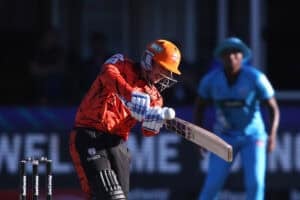Vir Die Liefde Van Die Land is a 10-part series highlighting the journeys of South Africa’s new era farmers, mostly black, who continue to farm against all odds.

With farming in the spotlight as many decry the violent crimes experienced by South African farmers, one can’t help but notice how lily white the face of South African farming is.
South African farming found itself in this spotlight recently after a young farm manager named Brendin Horner was murdered and his body was left tied to a pole.
This has sparked unrest which led to a violent protest outside the Senekal Magistrates Court in the Free State on Tuesday.
Interestingly, a brand-new show “saluting the unsung heroes of Mzansi agriculture” is set to hit the small screens on Thursday evening, hot on the heels of all these developments.
Described by producers as “raw, real and cutting-edge”, Vir Die Liefde Van Die Land (“For The Love of the Land”) is expected to be a first for local television.
Vir Die Liefde Van Die Land is a 10-part series highlighting the journeys of South Africa’s new era farmers, mostly black, who continue to farm against all odds.
The show is hosted by award-winning presenter Ivor Price and Piet Potgieter, a KwaZulu-Natal-born farmer who trades his life of extensive cattle farming for one in front of the cameras.
“Often their lives aren’t pretty. Their farms aren’t glamorous. Their journeys are painful, and yet these up-and-coming and newly commercialised farmers are going above and beyond to feed the nation,” said Price.
The first episode will feature 73-year-old Samson Mahlaba who worked as a labourer for 50 years before transitioning to a commercial farmer five years ago.
RELATED: Farm attacks: ‘Not a matter of if, but when you become a victim’
The episode will follow Mahlaba, who farms with his two grandsons just outside the Free State town of Reitz, as he explains that he was but a child when he first started working as a farm labourer. Although, at the time, there were no other black farmers in his vicinity, he always believed that his day would come.
“I always dreamed of becoming a farmer because I loved the farm,” said Mahlaba, before adding “farming to me is like a disease that I was infected with. It’s a disease that I do not know where it came from.”
According to the show’s producers, his dream of owning land came true after he partnered with the VKB Group, an agricultural enterprise. VKB formally assigned farmer Coenraad Fick, 62, as his mentor although the two have known each other since childhood. Mahlaba spent most of his career working for Fick’s father.
Potgieter, one of the show’s hosts, has been actively involved in the upliftment of black farmers since 1986 when his family was involved with the 1986 Ngotshe Cooperation Agreement in KwaZulu-Natal.
In an earlier research article published by Gerhard Maré and Georgina Hamilton in the Journal of Natal and Zulu History, the accord is described as “a pact between rugged Afrikaner farmers, conservative to the bone, and skinclad Zulu men”.
“Doing development work in South African agriculture is like working for the welfare where you put in a lot, but don’t easily see success. But, for me, it is enough to know that I am doing the right thing by advancing farmers who haven’t had it easy in this country,” said Potgieter.
READ NEXT: Whites don’t play, says Malema as Popcru slams ‘unruly’ protesters outside Senekal court
Food For Mzansi co-founder Kobus Louwrens, who produces the show in partnership with VKB, says, “We find and tell the stories of ordinary South Africans working together for a better future. The people in these stories choose to emphasise what they have in common rather than what divides them. They do so for the sake of their own prosperity and that of their communities. I find that enormously exciting because it shows nation-building and personal growth in action, all for the love of the land.”
You can watch Vir Die Liefde Van Die Land on Thursdays at 6pm on VIA (DStv channel 147), with repeats on Saturdays at 10.30am, Sundays at 8pm and Mondays at 8am.
The show has English subtitles and was filmed in parts of the Free State, Western Cape and Limpopo.
For more news your way, download The Citizen’s app for iOS and Android.






